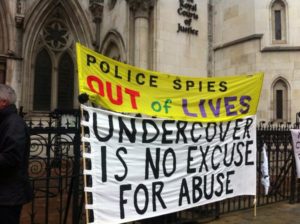Join the new legal push for justice
Since 2011, women deceived into relationships with undercover police officers groups have been fighting for truth and justice.
Four years ago a public inquiry was established to investigate the wrongdoing of these Metropolitan Police Special Branch squads. Originally scheduled to report in 2018, the Inquiry has been fraught with delays caused by police obfuscation and applications for officers’ anonymity. Evidential hearings will not now begin until 2020 with a current reporting date of 2023.
For a range of reasons, including a lack of confidence in Inquiry chair, Sir John Mitting, the women affected have no faith that the Inquiry will provide the answers we need, the disclosure we’re looking for or result in a clear declaration that undercover officers forming intimate relationships with those they are spying on is not only unlawful but should be subject to criminal sanctions.
The Inquiry is not fit for purpose. With the current chair and no supporting panel of advisors, it cannot deliver the justice and accountability we need and the public deserve.
We still need answers about how and why our most private lives were violated. Those responsible still need to be held to account and a clear message sent that such behaviour by the police must never happen again.
So now what?
There are other legal avenues open that could achieve our objective of truth and justice. A case brought by Kate Wilson before the Investigatory Powers Tribunal has already started to produce disclosure and has the potential to lead to legislative change which would prevent these abuses from ever happening again. A second case is awaiting consideration at the United Nations (CEDAW) against the UK government, claiming this practice discriminates against women. These cases offer the opportunity to set a benchmark that could force more openness from the secretive public inquiry. As the reality of how these units operated becomes clearer, we are seeing increasing evidence of what we believe to be a ‘conspiracy to rape’ and the urgency of this search for answers becomes all the more apparent.


